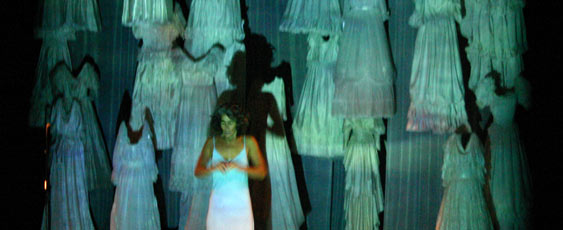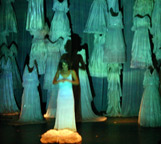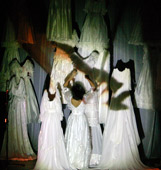
Practitioner Voices: Jane Bacon
Interviewed September 2004 by Becca Gill as part of the Total Theatre Explores research project.
Jane Bacon is the Artistic Director of Redleaf Dance, and Reader in Performance Studies at University College Northampton.
She is committed to explorations of process in interdisciplinary performance work that involves video, movement,
sound/text within a framework of personal histories, or self-ethnographies.
Her interest in documentation and the
articulation of creative processes has led to the establishment of the Arts Council England funded Choreographic Lab
(artistic directors Jane Bacon and Vida Midgelow) where she and other artists can play with the blurring of boundaries,
transforming the writing about performance, and other documenting processes.
Previous performance and video work includes:
The Woman (2001, 2002, 2003) a continuing research project with intermittent performance outcomes, Insistence...cont'd (2001),
Shimmies and Veils in Middle England (1999); Going for it! Dancing and Community in Northampton (1998); The Collection
(with Midgelow, 1999); Phasia (with Hale, 2000); Practically Perfect by Practically Perfect People (with Daniels, 2000);
Trains, Planes and Automobiles (with Hale, 2001).
How do you describe your artform practice?
Movement-based interdisciplinary performance.
How do you describe your work?
Well, that depends on the context. If framing it for academics, then I frame it within loose notions of ethnographic methodologies and with that add in something about the 'practice as research' agenda and the role of documentation. If I am framing it for Arts Council or an artistic audience then I frame my work around more theatrical and expressive display, something that blurs the boundaries between dance, film, song, text.
What are your main areas of inspiration and do they change with each project?
It is interesting, I don't think my primary sources of exploration have really changed in that I really like a lot of the lineage of the early stages of dance, such as the Judson group, and the politics of people doing something different, but I never really make work like that. I think it's probably something of Tricia Brown's and Yvonne Rainer's early work when they were trying to work with text and movement, attempting to destabilise the word 'dance', playing with the relationship between the audience and performer. My interest in those things seems to stay constant.
I think I have a tendency to make work which is more and more theatrical. It is a thread I have noticed over a long period of time. My early experiences of musical theatre seem to emerge in textures, colours, theatrical expression. Those are things that I really miss in most contemporary dance, and I love playing with the tension between those two worlds.
For analytical and theatrical inspiration, I like the work of post-Jungian theorists as I believe these to be interesting for the performer's perspective.
Does gender matter in performance?
I don't think it matters, but I think it's inescapable, and I think it matters if it matters to the performer. So, if I am interested in a play or material, and begin working with material that deals with gender issues, then it matters in an obvious way, in that it matters to the work rather than to me.
Does your body determine the work you make or the way in which you make it?
I want to say no, as I am not convinced that my body as a woman is determining what I make and what I want to make and what people are seeing. I like to think, as a feminist, that actually it is me, as a person, but I feel very shaky about that! I know, as a viewer, that I see gendered bodies in the performance space, on the stage. I am interested in playing with that, so if I move in what might be constructed as a 'seductive' way through the activation of certain muscles and body parts, how does that shift what the audience see and understand of my body?
Would you consider your artistic priorities to be different to those of men?
Yes, I think so, because I do not know of any men who are working with the self as a source, and trying to find ways of speaking to other people and other women of how if feels to be a woman in our culture. I cannot think of any men who or are interested in that.
Would you consider that your aesthetic criteria are different to the aesthetic criteria of men?
Not so much, I think one of the things I am interested in is this working across forms - movement, sound, video etc - and there is a particular aesthetic quality that is particular to me. As a gender 'thing'... it's hard to trail back to all the visual pieces I have done. I wonder if the visual representations and choices I make in editing are the same choices men would use.It is hard to say, and I would like to say it was not different, but of course it would be different.
The question seems to be: would it be different because I am a woman or because my particular cultural construction is a+b+d instead of a+c+f, if you see what I mean. Surely it is an impossible question to test in any meaningful way?
How would you define feminism?
I would define it in lots of different ways. In a straightforward standard answer, feminism is a body of theory that is primarily concerned with particular political and gender positions that will enable women to change their lives and the world in which we live. On a personal level, I feel I have jumped from somewhere in the 70s to the 21st century and missed out the bits that do not suit me, so I still have a really strong commitment to those early radical feminists. I was a radical 14 year-old feminist, and felt so strongly that I must change the world so that we could all have the same opportunities as men. Then I skip lots of decades and pick it back up today, with a softer edge.
Perhaps in youth it is the persona we create that is more manlike in order to fight the inequalities, and later in life it becomes possible to find the self, the part that can fight inequalities without pretending to be like those who we perceive to be oppressing. Feminism is now allowing us to fight for certain issues... and it is OK to be old, and I do not want to have to hide this. It feels a lot better now to say, yes, I am a woman.
According to your own definition would you call yourself a feminist and what does that term mean in relation to yourself & your work?
One of the key themes in my PhD thesis was exploring how women (in this instance women who dance Arabic dancing) can break the typical stereotype boundaries of mass media images of woman. When we look at this kind of movement (Arabic or belly dancing), there is often a huge gap between audience perception and the experience of the woman dancing.
Being a feminist means I bring something particular when I am teaching - as I introduce students to feminist theory and to feminist approaches to making performance. Being a feminist also means something particular when I am in the studio, because the way I understand the world, the concerns I have about what it is to be a woman, are all explored in my creative processes.
Do you think that theatre can effect social change?
As an idealist yes, it can. I can't imagine saying anything else to my students. But that seems too simplistic because things shift both in performance and in the social arena and is hard to work out which is causing which. I don't think it's one way; there are moments where a performance can speak to the world, and then someone begins to act and think differently. Perhaps it's more like a mobius strip, a feedback loop where one feeds from the other and vice versa.
How would you define the effect of the funding system on women's performance work?
The funding system, I find this very interesting as in the United States funding is bad, but artists still make work even without funding. I still find it interesting that there is not enough funding and that people think we are not capable in funding ourselves. Big-scale companies rely so much on funding, that as a woman it contributes to the whole problem as to how to survive as a woman. If you are a female freelance performer, what happens if you have a child?
What do you see as the biggest problem facing women in performance today?
As a dancer, I think one of the biggest problems is that, as a dancing body, the question of ageing is a problem. I think this will come to a crunch soon in my own work as I notice my dancing change and become less virtuosic but where that will come to rest I don't know, as I still want to dance and still do dance. Another big pressure is innovation and creativity, which is a personal anxiety. If I am working on something that takes me on a route and someone says, this is not trendy, well I am sorry but this something I have to do, and feel that the funding system generates this problem most of the time.
We are very happy inventing the way we are, whatever the age and capability we are, and whatever vision.
What from your perspective is the future for women within performance?
It feels like it is just coming up to be a good time to be a woman who is getting older in performance. This is something new. I do not think it is a good time to be a young performer as it is very, very competitive and they are a generation who have not been interested in politics. They will hit problems we learnt and fought through a long time ago.
Voices:



